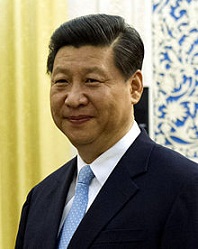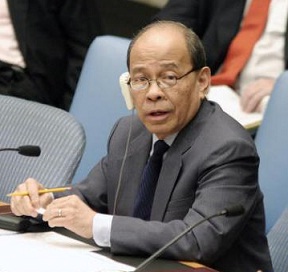Chinese President Hu Jintao will turn over leadership to Vice President Xi Jinping.
One of the Philippines’ seasoned diplomats, Lauro Baja, formerly the country’s permanent representative to the United Nations talked to some members of media and shared his thoughts on how the Philippines should deal with the “new China.”
Baja, who also served as Foreign Affairs undersecretary for policy, thinks despite the change in leadership, China “will not be able to veer away too much from what is existing now. “
But, he said, “there is now a new dynamic in China, the news is now more vocal, the social media is more vocal and there is a greater degree of nationalism among people in the streets. As a matter of fact they now think and they may be rightly so that they are now the center of the world. “
That reality, he said, must be taken into account by the Philippine policy makers in dealing with China now.
Given the overlapping territorial claims on China and the Philippines, Baja said “we must find ways to either resume dialogue or initiate dialogue on other approaches” because military action is not an option. “ In our dispute or claim, we have no military option and I don’t think parties are thinking of the military option.”
Baja laments the “fixation on developing a code of conduct in the South China Sea as an upgrade of the Declaration of the Code of Conduct on the South China Sea.”“We are making the same objections as we did in the declaration and it is unrealistic to expect that a code could be concluded in the immediate future,” he said.
He pointed out that China has not budged from its view that there should not be an enforcement provision in case of violation and a dispute mechanism.
So how do we go from there?
Baja is not optimistic that the 10-member Association of Southeast Nations,which will have a summit meeting in Cambodia on Nov. 18- 20, would be able to conclude an ASEAN Regional Code of Conduct in the South China Sea and allow parties concerned including China to either accede or adhere to the declaration.
“Maybe that would be a creative approach. After all ASEAN’s Treaty of Amity and Cooperation has been acceded to by China so maybe there’s an example for a new innovative creative approach. But in the UNCLOS (United Nations Commission on the Law of the Sea) itself there are opportunities also for cooperative activities,” Baja said.
Despite the recriminations over the Panatag (Scarborough) shoal early this year, Baja believes the Chinese does not really consider the Philippines an enemy nor do we consider China one.
He said,”the only element which put a ‘fly on the ointment’ is the so-called in the PH-China relations is the perceived excessive dependence of the PH on the US and that’s a sore point to them.”
He related a conversation with recent Chinese visitor Fu Ying, vice minister in China’s foreign ministry who was formerly ambassador to the Philippines.
“ I told Fu Ying, because I know her I was undersecretary of foreign affairs then when she was ambassador here so we could talk frankly. I told her, the trouble with China is you talk to us thru the US why don’t you talk to us directly and we talk to you directly. And she said to me, ‘but you also talk to us thru the US.’
“ So again, that perception must be excised. We cannot deny that we are close to the US we are treaty allies, people-to-people exchanges are substantive but we cannot also deny that geography is immutable, we have a big neighbor to the north who is the second largest economy in the world and with a growing military and a growing international clout in international affairs so the challenge for Philippine diplomacy is to have a nuance approach to the competition, to the rivalry to the so-called boxing match as Pres. Ramos said between China and the US because whether we like it or not the security architecture of the region will be determined to a very large significant factor by the US-China relations.”
Related articles:
http://globalnation.inquirer.net/55590/china-bares-plan-to-be-a-naval-power

